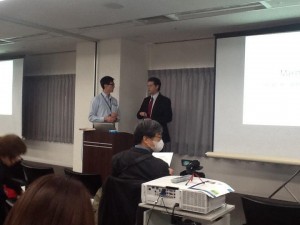conference curriculum elllo extensive listening extensive reading graded readers language courses Language learning materials online resources presentations self-study
by sendaiben
2 comments
Oxford Day 2013 video, slides, and writeup
I was extremely lucky to be invited to speak at the first Oxford Day in Japan this month.
I wasn’t really sure what to expect, but I really enjoyed the whole thing. 188 teachers attended, and there were nine presentations (five time slots). The venue was a very comfortable meeting space in Shibuya, and the provided coffee and sandwiches were excellent.
Most importantly for me, I had a fantastic group of teachers in my presentation who were very forgiving and asked me a bunch of questions at the end. Here is a copy of my slides in .pdf format and the video of the presentation is below:
131123 Maximising Input (slides in .pdf format)
If you have any questions please let me know in the comments, or send me an email to sendaiben@gmail.com.
high school jobhunting Language learning op-ed study abroad university
by sendaiben
7 comments
Japanese Students Studying Abroad
Here is an interesting article about Japanese students and the demand for study abroad programs (thanks Glenski).
*image stolen from the MOFA website
This seems to be a perennial topic of discussion, and there is much hand-wringing about how few students actually plan to study overseas.
To me this seems quite simple: I believe students are on the whole rational actors. Facing them are a range of issues:
- there are significant financial costs associated with studying overseas
- there is limited support for students to study overseas from universities and schools (generally students have to take time off from their studies)
- companies pay lip service to internationalization, but study abroad does not seem to help with job hunting and in fact hinders it greatly if students are away in their third and fourth years
- students don’t have the necessary language skills to study abroad after going through the normal English educational system in Japan
If these factors were flipped, particularly the third one, I am sure we would see interest rise.
What do you think? Is the system at fault or are Japanese students really the passive, docile, unadventurous generation that some media tries to make them out to be?
eikaiwa expectations high school JHS junior high school kids Language learning teaching vocabulary
by sendaiben
14 comments
My ‘almost’ mini-lesson
Unfortunately, many students in Japan are taught that ‘almost’ in English is ‘hotondo’ in Japanese
Sadly this is not true, so over the years I have developed a short mini-lesson to correct this false impression and help students better understand the meaning of almost.
The lesson can start at any time, but it requires a trigger: one of the students must translate almost as hotondo.
Once that happens, I quickly go through the following steps:
- I point out that even though many teachers and textbooks teach this, almost is not the same as hotondo
- I pretend to trip, and then say “phew, I almost fell over just now”
- I ask the students to translate the previous sentence: “hotondo korobimashita” sounds really strange, so clearly hotondo is not a good translation here
- I tell the students I planned to go to Tokyo this morning, but ended up not going. “I almost went to Tokyo”
- “Hotondo Tokyo ni ikimashita” also sounds weird
- I offer two alternative translations for almost: mou chotto de ~ and ~wo suru tokoro datta
- I explain that hotondo is actually almost all in English: mou chotto de zenbu
Of course, this illustrates vividly the perils of learning and teaching vocabulary out of context, which provides another excellent mini-lesson for the students 🙂
Do you have any favourite mini-lessons?
The Infantilization of University Students
I had a bit of a meltdown yesterday.
I’ve been under a bit of stress at work recently (admin issues I am not going to go into), which probably contributed to my reaction to my first period class yesterday morning.
Ten students were late, drifting in during the first five minutes of the class (another three turned up later).
For my class, I ask students to collect the work I return to them before the bell and make sure they are ready to start on time (I make sure I am there ten to fifteen minutes early to set up). We then normally finish five to ten minutes early.
Yesterday, I let the late students take their papers and sit down. I didn’t say anything for a minute or so.
Then I let them know I was annoyed. In a mixture of Japanese and English (I rarely speak Japanese in class, and only do so to make a point), I explained the following in a firm way without shouting 🙂
- The class starts when the chime goes at 8:50
- I expect them to be ready to start at that time
- For this many people to be casually late is completely unacceptable
- From next week, if you are late I am just going to send you home
- If you can’t come on time, don’t come
After which I switched back to my usual relaxed self and conducted the rest of the class normally.
The incident got me thinking though. I always end up thinking about things I do differently, especially when they are unplanned as this was.
I think it will work, with my students, at my university. They are good students, I’m not asking anything unreasonably, and the university pretty much lets teachers lay down the law.
The thing is, I would never have done anything like that with a class of adults, in any setting. And my students are adults, at least in the UK. Most of the second-year class yesterday are also legally adults in Japan. But I treated them like a junior high school class.
I often hear colleagues refer to university students as ‘kids’, and I used to make a point of not doing so myself. Recently, though, I have noticed the word creeping into my own conversations too.
I wonder if we are infantilizing university students? After all, universities in Japan are basically an extension of high school, with the same packed schedule, the same lecture-style teaching approach, and the same focus on tests, tests, tests.
Do the students behave childishly because they are childish or because we treat them like children?
I don’t have the answer to this, but I wonder about it sometimes…
Anyone else teach at a Japanese university? Would changing institutional and teacher expectations improve things?
5 simple tips for English classes
There are a number of really simple techniques that I tend to use in almost all my classes, so I thought it might be interesting to put some of them down here.
1. Use name signs for attendance, to learn student names, and for classroom management
I first wrote about this in 2006! Still using it now though, with the addition of the technique below that I got from my partner in crime, Daniel E. This tip is best for teachers that teach a lot of students, who basically are not able to learn names under normal circumstances.
2. Assign students class numbers to help with classroom management and paperwork
For medium-sized classes and larger, it can be really useful to assign students a class number, to be used in addition to their existing student numbers, etc. Basically give each student a number, starting from one. Have them put it on everything that they hand in (notebooks, worksheets, exam papers, etc.). You can collect them in order or just put them into order quickly after you collect them.
Then, when you come to mark them, you can work through them quickly making a note of grades in your excel sheet or markbook.
Returning the papers is also easier as they are in order. You can pass them out if students are in assigned seats, or leave them at the front in piles (easy for the students to find theirs as they are in order).
3. Dictate questions instead of giving students handouts
I used to think dictation was horribly old-fashioned, but have come to realise that the reason it’s been used for centuries is that it works 🙂
Recently I’ve been dictating questions to students instead of printing them on handouts, and dictating homework assignments. It takes a bit more time than just handing out pre-printed versions, but this way the students get to work on their listening and writing, and end up thinking about the content more.
A really easy change to make.
4. Put students in groups of 3 for group work
I used to do group work with groups of four or even (gasp!) six. The inevitable consequence of this is that some students end up doing nothing for long stretches of time. However, working in pairs means that some students can be stuck with an unskilled or unmotivated partner.
Groups of three seems to be the sweet spot, and ensures that no-one can hide from the activity, and students are less likely to be stuck with an uncooperative partner. Threes also minimize the chances of two friends bypassing the activity to continue a previous conversation!
5. Use a visible timer for activities
I have started using a countdown on my computer for short speaking activities, and find that it frees me from having to ‘guesstimate’ when to wrap things up. Also, students know how long they have to keep talking for, which makes it easier to give that one last push.
I like the online stopwatch in full-screen mode, either showing the computer screen to students or using a projector to do so for larger classes.
How about you? Do you have any good tips for other teachers?




